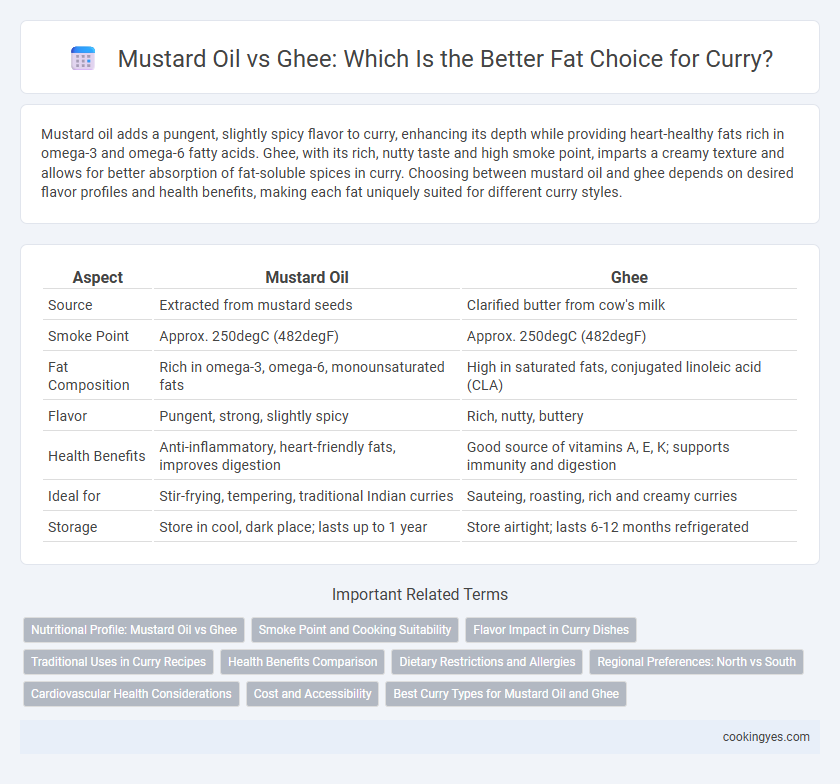Mustard oil adds a pungent, slightly spicy flavor to curry, enhancing its depth while providing heart-healthy fats rich in omega-3 and omega-6 fatty acids. Ghee, with its rich, nutty taste and high smoke point, imparts a creamy texture and allows for better absorption of fat-soluble spices in curry. Choosing between mustard oil and ghee depends on desired flavor profiles and health benefits, making each fat uniquely suited for different curry styles.
Table of Comparison
| Aspect | Mustard Oil | Ghee |
|---|---|---|
| Source | Extracted from mustard seeds | Clarified butter from cow's milk |
| Smoke Point | Approx. 250degC (482degF) | Approx. 250degC (482degF) |
| Fat Composition | Rich in omega-3, omega-6, monounsaturated fats | High in saturated fats, conjugated linoleic acid (CLA) |
| Flavor | Pungent, strong, slightly spicy | Rich, nutty, buttery |
| Health Benefits | Anti-inflammatory, heart-friendly fats, improves digestion | Good source of vitamins A, E, K; supports immunity and digestion |
| Ideal for | Stir-frying, tempering, traditional Indian curries | Sauteing, roasting, rich and creamy curries |
| Storage | Store in cool, dark place; lasts up to 1 year | Store airtight; lasts 6-12 months refrigerated |
Nutritional Profile: Mustard Oil vs Ghee
Mustard oil is rich in monounsaturated and polyunsaturated fats, particularly omega-3 and omega-6 fatty acids, which support heart health and have anti-inflammatory properties. Ghee contains higher amounts of saturated fats and fat-soluble vitamins A, D, E, and K, providing energy and essential nutrients but may raise LDL cholesterol if consumed excessively. Choosing between mustard oil and ghee depends on dietary goals, as mustard oil offers more unsaturated fats beneficial for cardiovascular health, while ghee supplies concentrated fat-soluble vitamins and a rich flavor ideal for certain curry recipes.
Smoke Point and Cooking Suitability
Mustard oil has a high smoke point of around 480degF (249degC), making it ideal for frying and high-heat cooking in curries, preserving the rich flavors without breaking down. Ghee, with a smoke point near 450degF (232degC), offers a slightly lower heat tolerance but imparts a rich, nutty flavor perfect for sauteing and tempering spices. Choosing between mustard oil and ghee depends on desired flavor profile and cooking method, with mustard oil preferred for intense heat and ghee favored for aromatic richness.
Flavor Impact in Curry Dishes
Mustard oil imparts a pungent, sharp flavor that enhances the authenticity of many regional curry dishes, creating a bold and aromatic profile. Ghee provides a rich, buttery, and slightly nutty taste that deepens the curry's complexity and adds a smooth texture. Choosing between mustard oil and ghee influences not only the flavor intensity but also the traditional character and mouthfeel of the curry.
Traditional Uses in Curry Recipes
Mustard oil and ghee have distinct traditional uses in curry recipes, with mustard oil favored in Eastern Indian and Bengali cuisines for its pungent flavor and high smoke point, enhancing the boldness of spicy curries. Ghee, commonly used in North Indian cooking, imparts a rich, creamy texture and aromatic depth essential for dishes like butter chicken and dal tadka. Both fats influence the final taste and texture, making them integral to regional curry preparation and cultural authenticity.
Health Benefits Comparison
Mustard oil contains high levels of monounsaturated fats and omega-3 fatty acids, promoting heart health and reducing inflammation. Ghee, rich in saturated fats and butyric acid, supports digestion and provides fat-soluble vitamins like A, D, E, and K. Choosing mustard oil may benefit cardiovascular health, while ghee enhances nutrient absorption and gut health in curry dishes.
Dietary Restrictions and Allergies
Mustard oil is a popular choice in Indian cooking for its pungent flavor and high smoke point, but it can trigger allergic reactions in sensitive individuals and is not recommended for people with mustard allergies. Ghee, clarified butter with a rich, nutty taste, is lactose-free, making it suitable for those with lactose intolerance, but it may not be ideal for individuals with dairy allergies. Choosing between mustard oil and ghee depends on dietary restrictions, particularly allergies to mustard or dairy, and personal tolerance to each fat source.
Regional Preferences: North vs South
Mustard oil is predominantly used in North Indian curries, prized for its pungent flavor and high smoking point suitable for tempering spices. In contrast, South Indian cuisine favors ghee, valued for its rich, buttery taste and ability to enhance the aroma of curry dishes. Regional preferences reflect cultural traditions and the impact of local climatic conditions on fat usage in cooking.
Cardiovascular Health Considerations
Mustard oil contains high levels of monounsaturated and polyunsaturated fats, including omega-3 fatty acids, which can help reduce LDL cholesterol and improve cardiovascular health. Ghee, rich in saturated fats, may raise LDL cholesterol levels but also contains conjugated linoleic acid and butyrate, which have beneficial effects on heart health when consumed in moderation. Choosing mustard oil over ghee for cooking may support better cardiovascular outcomes due to its heart-friendly fat profile and anti-inflammatory properties.
Cost and Accessibility
Mustard oil is often more affordable and widely accessible, especially in South Asian markets, making it a cost-effective fat choice for cooking curry. Ghee, while pricier due to its processing and dairy origins, offers a rich flavor but may be harder to find in some regions. Choosing between mustard oil and ghee depends on budget constraints and local availability, with mustard oil providing a more economical option for everyday curry preparation.
Best Curry Types for Mustard Oil and Ghee
Mustard oil's pungent and robust flavor enhances spicy North Indian and Bengali curries like Fish Curry and Bhuna Gosht, making it ideal for dishes requiring a strong aromatic presence. Ghee's rich, buttery taste complements creamy and mildly spiced curries such as Butter Chicken and Dal Makhani, adding depth and smoothness to the gravy. Both fats play crucial roles in traditional Indian cooking, with mustard oil best suited for bold, fiery recipes and ghee preferred for luxurious, slow-cooked curries.
Mustard oil vs Ghee for fat choice Infographic

 cookingyes.com
cookingyes.com